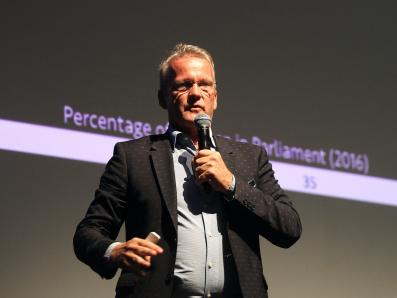 Finnish educator, author and advisor Pasi Sahlberg was in Sydney recently to deliver our annual Ann D Clark lecture. There aren’t too many countries that haven’t been compared or aspire to the Finnish model of education. I don’t want to disappoint the publishers, pundits and policymakers but in his keynote, Pasi revealed some home truths about the Finnish education system that debunks many of the urban legends that surround Finnish schools.
Finnish educator, author and advisor Pasi Sahlberg was in Sydney recently to deliver our annual Ann D Clark lecture. There aren’t too many countries that haven’t been compared or aspire to the Finnish model of education. I don’t want to disappoint the publishers, pundits and policymakers but in his keynote, Pasi revealed some home truths about the Finnish education system that debunks many of the urban legends that surround Finnish schools.
The first was a report published in the reputable Independent Newspaper in 2015 proclaiming that Finland would scrap its Subjects. Not true according to Pasi. In fact Finnish schools continue to teach Subjects but what was missed in the report was that within their new national curriculum framework, schools must include a period of time each year where subjects are replaced by some kind of project-based learning. This might be over two days or over a semester, it depends entirely on what the school thinks is best for its learners. The real highlight in this story is the amount of professional freedom and autonomy for schools to write their own curriculum within an over-arching framework and for students to be engaged in planning and assessing what they learn within the project period.
The second myth is that Finland doesn’t give students homework or that it is minimal. Pasi was quick to point out that this was one of the most ‘dangerous myths’ because other countries want to follow in the footsteps by abolishing homework. The truth is that Finnish schools do give students homework but their approach is mindful and meaningful. In other words, it is not homework for homework’s sake or because parents want it or teachers haven’t had time to cover a concept in class. Pasi says there is always a clear reason for doing homework and children fully understand the purpose of it in the context of their learning. Pasi made the point that it would be virtually impossible to learn maths simply by attending class without embedding the knowledge at home through practising and problem-solving.
Myth number three is that Finland only attracts the best and brightest to the teaching profession. This resonates with debate here in Australia over raising entry levels into teacher degrees and introducing literacy and numeracy tests for graduate teachers. The truth is that all teachers in Finland are prepared through a research university and must have a Masters degree to teach but this doesn’t make them better teachers. Pasi said the competitiveness of entry into a teaching degree isn’t based on those students who were academically superior at school. Rather, the university accepts students who may score low in English and Maths but have other skills as musicians, actors, athletes or community workers that make a valuable contribution to the learning community. The take-home message is that you don’t have to be academically gifted to be the best teacher.
Pasi’s keynote confirmed what we already know. That is, it’s futile for schools or systems outside of Finland or anywhere else to imitate. What we can do is to learn from best policy, practice and outcomes and contextualise it to our own learning communities.
** If you would like to hear more of Pasi and other innovative educators in conversation, we’re launching a new podcast series soon searchable through iTunes and Soundcloud called Bluyonder Voices. Stay tuned via the blog for updates and links.
Share this:






